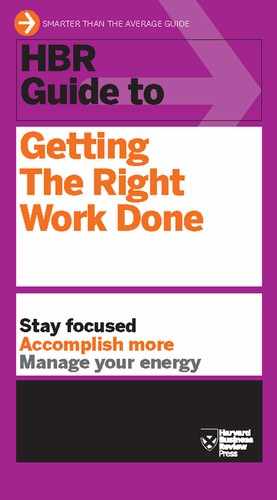Chapter 4
Get a Raise by Getting the Right Work Done
by Peter Bregman
My friend Dave is notorious for eating fried food. (Names and some details changed.) Yet recently he was surprised to learn that his cholesterol was high because, as he put it, “The day before the test, I ate really well.”
The idea of immediate results is alluring. But whether it’s managing our diet or prioritizing our workload, there are no quick fixes.
I was reminded of this when a reporter asked me what advice I would give to someone who wanted to ask for a raise at a time when most wages are stagnating or falling. My answer? Don’t ask.
It’s not that I think people can’t get raises right now. But if you haven’t spent the last year laying the ground- work, it’s highly unlikely that you’ll be successful now. There’s no formula—no perfect words or spinning of events—that will magically deliver a raise with a day or two of preparation.
But there is a formula for getting more money over time. And it starts with your ability to prioritize.
The formula is based on one simple premise: We can get more money when we demonstrate that we’ve added more value. And we can add more value when we spend the majority of our time focusing on the work that the most senior leaders in our organization consider valuable, which is almost always work that increases revenue or profits, either short-term or long-term.
But when we’re not clear about what work is most important to our organization, one of two things can happen: Either we put the same amount of energy and effort into everything or we let the wrong things fall through the cracks.
Making more intentional and strategic choices about where to spend our time can mean the difference between a stagnant salary and a growing one. We can be more productive when we know which initiatives deserve our highest priority.
Here’s my formula for getting a raise:
- During this year’s compensation conversation, take whatever is given to you without negotiation and with appreciation. Then explain that you’re less interested in a raise right now and more interested in how you can add tremendous value to the organization.
- Think like a shareholder of the company. Ask lots of questions about the strategy and what’s keeping the top leaders awake at night. Understand how your department affects revenue or profitability and what’s important to your direct manager. With your manager, identify the top two or three things you can work on that will drive revenue or profitability. Once you’ve had that conversation, you’ll have your raiseworthy work focus.
- Now keep those two or three revenue and/or profitability drivers at the top of your to-do list. Approach your daily work so that the majority of your effort moves the organization further in those areas. Share your to-do list with your manager, to keep you on the same page about your priorities and how your work affects the bigger picture. Quantify the impact you’re making. If your manager asks you to do things outside of your top priorities, push back and discuss the possible trade-offs you could make. Sure, you’ll need to work on some things that aren’t important. But make a strategic choice to shortchange those.
After about six months of this laser focus, you’ll be ready to talk about how you’ve added tremendous value on the things that matter most.
During that discussion you’ll also be ready to talk about a real raise. That’s good timing, since most organizations are beginning to think through their departmental budgets and promotions around the six-month mark.
Here’s why this formula works: It’s not a trick. If you focus on your highest-priority work—even if it requires that you push back when your manager asks you to work on other tasks—ultimately you and your manager will be more productive, and the organization will benefit. That’s money in the bank. It will make your job more secure and you more promotable.
“So,” I asked Dave. “Now that you know you have high cholesterol, are you going to change the way you eat?”
“No,” Dave answered, true to form, “I’m taking a pill. My cholesterol will be lower in a few days and I can still eat everything.”
Maybe I like doing things the hard way. But as far as I know, there’s no pill for getting a raise.
____________
Peter Bregman is a strategic adviser to CEOs and their leadership teams. His latest book is 18 Minutes: Find Your Focus, Master Distraction, and Get the Right Things Done.
